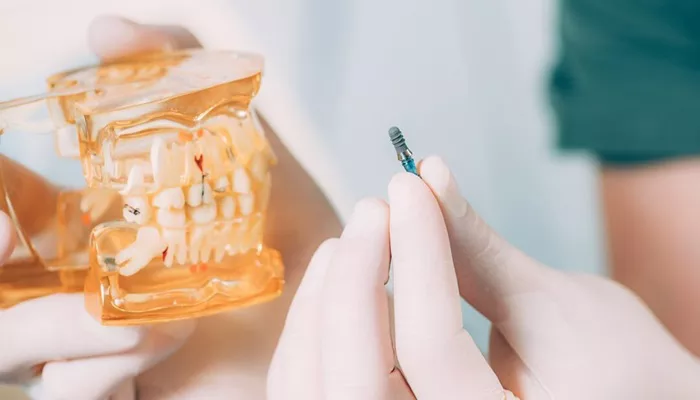Dental implants have revolutionized the field of restorative dentistry, offering a durable and aesthetically pleasing solution for missing teeth. However, in rare cases, dental implants can become loose or fall out. Understanding what happens when a dental implant falls out is crucial for both patients and dental professionals. This comprehensive article delves into the causes, consequences, and steps to take if an implant falls out.
Causes of Dental Implant Failure
Dental implant failure can occur due to a variety of reasons. Identifying the root cause is essential for proper management and prevention of future issues. Here are some common causes:
Insufficient Bone Density: For a dental implant to integrate properly, there must be enough healthy bone to support it. If the bone is insufficient or deteriorates over time, the implant may fail to anchor securely.
Infection: Peri-implantitis, an inflammatory condition that affects the tissues surrounding the implant, can lead to bone loss and implant failure. This infection is often caused by poor oral hygiene or pre-existing gum disease.
Poor Placement: The success of a dental implant heavily depends on its placement. If the implant is placed incorrectly, it may not integrate properly with the bone, leading to failure.
Mechanical Issues: Over time, mechanical problems such as a loose abutment or crown can occur. These issues can lead to implant instability if not addressed promptly.
Excessive Load: Applying excessive force to an implant, such as through teeth grinding or an improper bite, can cause it to fail. This excessive load can hinder the integration process and lead to implant loosening.
Smoking and Lifestyle Factors: Smoking can impair blood flow and healing, increasing the risk of implant failure. Additionally, poor nutrition and overall health can contribute to complications.
SEE ALSO: What Does A Dental Implant Abutment Look Like?
Consequences of A Falling Out Implant
When a dental implant falls out, several consequences can occur, affecting both the patient’s oral health and their overall well-being:
Bone Loss: The absence of a dental implant can lead to bone resorption at the implant site. The bone that once supported the implant may begin to deteriorate, complicating future implant placement.
Gum Recession: The loss of an implant can cause gum tissue to recede, creating a gap or uneven appearance in the smile.
This can also make the area more susceptible to infection.
Functional Issues: A missing implant can affect chewing efficiency and speech. The loss of a functional tooth replacement may lead to discomfort or difficulty in daily activities.
Aesthetic Concerns: The gap left by a fallen implant can impact the overall appearance of the smile. This may affect self-esteem and confidence, leading to psychological distress.
Increased Risk of Infection: An exposed implant site can become a breeding ground for bacteria, increasing the risk of infection. This can further complicate the situation and delay healing.
Steps to Take If A Dental Implant Falls Out
If a dental implant falls out, it is crucial to take immediate action to address the issue and prevent further complications.
Here’s what to do:
Contact Your Dentist: The first step is to contact your dentist or oral surgeon as soon as possible. They will provide guidance on the next steps and arrange an appointment for evaluation.
Preserve the Implant: If the implant is intact, try to preserve it by keeping it clean and dry. Avoid touching the surface that was in contact with the bone to prevent contamination.
Assess the Area: Examine the implant site for any signs of infection, such as swelling, redness, or discharge. This information will be valuable for your dentist in diagnosing the issue.
Avoid Self-Treatment: Refrain from attempting to reinsert the implant yourself or using over-the-counter products to address the problem. Professional assessment and intervention are necessary to ensure proper management.
Follow Up with Treatment: Based on the evaluation, your dentist will recommend appropriate treatment options. This may include addressing any underlying issues, such as bone grafting or infection control, before attempting to place a new implant.
Preventive Measures And Maintenance
To reduce the risk of implant failure and ensure the longevity of your dental implants, consider the following preventive measures:
Maintain Good Oral Hygiene: Brush and floss regularly to keep your mouth clean and free from plaque. Regular dental check-ups are essential for monitoring implant health.
Avoid Excessive Force: Be mindful of habits such as teeth grinding or chewing hard objects. If necessary, use a night guard to protect your implants from excessive force.
Follow Post-Operative Care Instructions: Adhere to the care instructions provided by your dentist following implant placement.
Proper care during the healing period is crucial for successful integration.
Regular Dental Visits: Scheduleregular dental visits for professional cleanings and exams. Your dentist will monitor the condition of your implants and address any potential issues early on.
Healthy Lifestyle Choices: Avoid smoking and maintain a balanced diet to support overall oral health and healing. A healthy lifestyle can contribute to the success and longevity of your dental implants.
Conclusion
Dental implants are a highly effective solution for replacing missing teeth, but they are not without risks. Understanding what happens when a dental implant falls out is essential for both patients and dental professionals. By recognizing the causes, consequences, and appropriate actions to take, you can ensure the best possible outcome and maintain optimal oral health.

